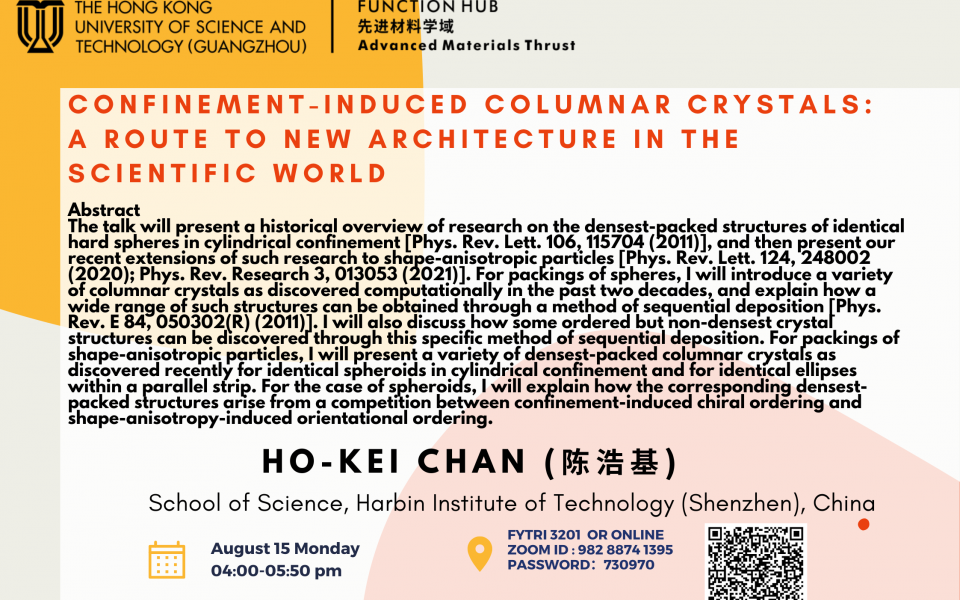Public Research Seminar by Advanced Materials Thrust, Function Hub, HKUST(GZ) - Confinement-induced columnar crystals: A route to new architecture in the scientific world
Identical spheres in cylindrical confinement exhibit a complex variety of densest-packed columnar structures. Such densest-packed structures can serve as theoretical models for the structures of a variety of quasi-one-dimensional physical systems, such as nanotube-confined fullerenes, nanochannel-confined copolymers, colloidal crystal wires, capillary-tube-confined thermoresponsive microspheres, capillary-tube-confined microbubbles, and fluid-driven self-assemblies of polymer beads. On the other hand, there have been comparatively few studies of this kind for shape-anisotropic particles. Thanks to their rotational degrees of freedom, shape-anisotropic particles in cylindrical confinement exhibit densest-packed structures with non-trivial orientational order, and therefore they demonstrate a greater variety of densest-packed crystal structures than their spherical counterparts.
In this talk, I will present a historical overview of research on the densest-packed structures of identical hard spheres in cylindrical confinement [Phys. Rev. Lett. 106, 115704 (2011)], and then present our recent extensions of such research to shape-anisotropic particles [Phys. Rev. Lett. 124, 248002 (2020); Phys. Rev. Research 3, 013053 (2021)]. For packings of spheres, I will introduce a variety of columnar crystals as discovered computationally in the past two decades, and explain how a wide range of such structures can be obtained through a method of sequential deposition [Phys. Rev. E 84, 050302(R) (2011)]. I will also discuss how some ordered but non-densest crystal structures can be discovered through this specific method of sequential deposition. For packings of shape-anisotropic particles, I will present a variety of densest-packed columnar crystals as discovered recently for identical spheroids in cylindrical confinement and for identical ellipses within a parallel strip. For the case of spheroids, I will explain how the corresponding densest-packed structures arise from a competition between confinement-induced chiral ordering and shape-anisotropy-induced orientational ordering. For the case of ellipses, I will explain why the corresponding densest-packed structures are all affine transformations of particular densest-packed structures of circular disks. It is believed that the confinement-induced crystal structures presented in this talk could constitute a basis for the development of novel low-dimensional materials with tailored translational or orientational order.
Ho-Kei Chan (陈浩基) joined the Harbin Institute of Technology, Shenzhen as an Associate Professor of Physics in 2016. He obtained an undergraduate degree in Engineering Physics in 2002 from the Hong Kong Polytechnic University (China), and a PhD in Physics in 2007 from the University of Manchester (U. K.). The latter was followed by post-doctoral research appointments at the Hong Kong Baptist University (China), Trinity College Dublin (Ireland), and the University of Nottingham (U. K.), respectively. Ho-Kei’s current research interests include (1) the densest-packed structures of particles in geometric confinement and (2) the electrostatic properties of dielectric materials.
